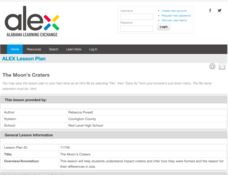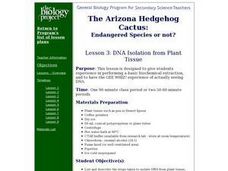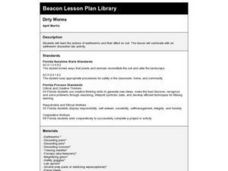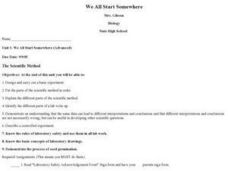Alabama Learning Exchange
What Burns When a Candle Burns? an Introduction to Using the Scientific Method
Middle schoolers use the scientific method to discover the role of a candle's wick and how radiation allows candle wax to change from solid to liquid to gas. They work in small groups to use the steps of the scientific method approach in...
Curated OER
DNA Isolation from Plant Tissue
Students perform an experiment to extract and observe DNA from plant Tissue. They read about the procedure and relate it to the procedure used to isolate DNA from an endangered plant species. This is lesson three in a nine lesson unit...
Curated OER
This One is for the Birds
Students create a bird feeder to form their technological skills and create a better bond with nature. In this nature lesson plan, students use websites, technology, brainstorm ideas, and build models.
Curated OER
Providing Safe Food to the Consumer
Students identify safe practices that must be followed to assure the food chain from the farm or ranch to dinner table is providing safe and quality food for the consumer. Students visit websites to examine numbers of food borne...
Curated OER
It is a Crash Test, Dummy
Pupils research air bags on the Internet and use the information to design their own version of an air bag. After exploring the benefits and dangers of air bags students perform a chemistry lab in which they mix baking soda and vinegar...
Curated OER
Taking Picture Using a Pinhole Camera
Ninth graders produce a lithographic negative from a pinhole camera and solve problems if light leaks appear on the negative. They are able to describe and use lab safety procedures presented in class.
Curated OER
Bungee Man Lab
Students explore the motion of a toy bungee jumper using the scientific method. They view a video of a bungee jumper and discuss what can be measured about a bungee jump. Students discuss the scientific mehtod and how to design an...
Curated OER
DOES A FLUCTUATION IN TEMPERATURE IFFECT THE GROWTH AND SURVIVAL RATE OF AQUATIC PLANTS?
Students determine if different temperatures effect the growth and survival rates of aquatic plants and evaluate the optimal temperature for the growth of aquatic plants.
Cornell University
Nano What?
The size of a nanoparticle is difficult for pupils to grasp. A hands-on experiment is designed to give your classes perspective. Learners analyze different sports drinks for the content of electrolytes as an introduction to nanoscale....
Beyond Benign
Catalysts and Oxygen
Here is an engaging and hands-on lesson plan that allows high school chemists to demonstrate the effects of a catalyst on various chemicals. They garner knowledge of how reactants and products differ from one another, while analyzing the...
National Nanotechnology Infrastructure Network
Creating and Testing Silver-Nanoparticle Socks
Antibacterial socks are a product of nanotechnology. An inquiry-based lesson asks collaborative groups to create their own antibacterial socks and then test them against other products on the market. The sock with the least amount of...
Curated OER
Dependence of Light Intensity on Distance
Hopefully you have a sensor interface for your physics class to use with graphing calculators when collecting data with a light sensor. If so, read on. Use this resource for learners to predict and then test whether or not the intensity...
Curated OER
Competition/Cooperation Relationships
Students view the PowerPoint slide of a lynx and hare and discuss what would happen if all the lynxes were destroyed. They then take notes on the lesson and brainstorm about other competitive/cooperative relationships as well as discuss...
Curated OER
Tie Dye
High schoolers practice writing research proposals to test the color fastness of a dye once it has been exposed to a t-shirt. Each proposal needs details of experimental design, length of treatment, and means of cleaning the shirt. All...
Curated OER
Measuring Aquatic pH
Students apply the scientific method and safety rules to aquatic pH. They test unknown solutions for pH levels.
Curated OER
Molar Ratio
Students conduct an experiment in which they react sodium bicarbonate with hydrochloric acid to determine the molar ration between the two reactants. Students must write correct formula and a balanced chemical equation and explain how...
Curated OER
Flame Test
Students conduct a flame test on different substances. In this chemistry lesson, students predict the element present based on the color emitted during the flame test. They explain how different elements produce different colors.
Curated OER
Testing Your Water
Students perform several water quality tests on groundwater from their area. They use test strips to determine the pH, hardness, alkalinity, nitrates, iron and chloride levels.
Curated OER
The Accident That Did Not Happen
Pupils examine science lab equipment and review the basic rules of laboratory skills.
Curated OER
Dirty Worms
Students examine the functions of earthworms and their effect on soil. They conduct an earthworm dissection lab, and complete a checklist.
Curated OER
We All Start Somewhere
Students demonstrate an understanding that the same data can lead to different interpretations and conclusions and that different interpretations and conclusions are not necessarily wrong, but can be useful in developing other scientific...
Curated OER
Density of a Gas
Eighth graders investigate the mass, volume, and density of a gas by producing it in a chemical reaction. The entire Density of a Gas Lab and L section of the K W L chart be formatively assessed.
Curated OER
What Does That DNA Molecule Really Look Like???
Students extract DNA from animal liver cells. They separate, collect and describe the appearance from the extracted DNA while role playing as an intern in a city's forensics.
Curated OER
Earthquakes and Seismic Waves
Students investigate the Richter scale and seismology in a teacher-led lab in which they are introduced to the concept of seismic waves and epicenter location. They further investigate the inner workings of a seismograph and practice...

























